Adelaide Riverbank: How new developments have changed the face of the CBD
“THE Riverbank development is at the heart of the State Government’s plans to revitalise the city”, Premier Jay Weatherill said in 2011. Six years on, Adelaide’s most recognisable postcard image is taking shape.
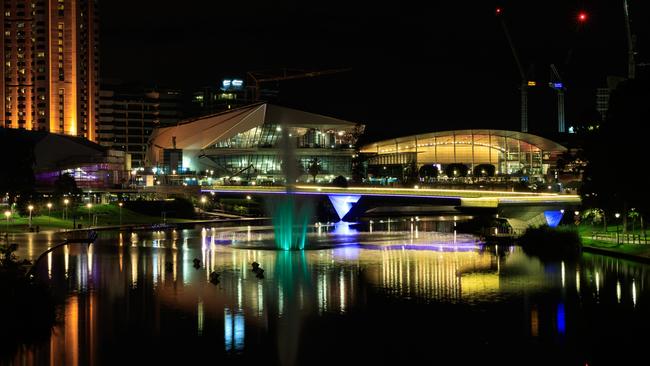
SA News
Don't miss out on the headlines from SA News. Followed categories will be added to My News.
- Interactive lighting project knocked back
- Six-star hotel planned for Riverbank
- State Govt should take control from City Council, says Riverbank authority
“THE Riverbank development is at the heart of the State Government’s plans to revitalise the city”, Premier Jay Weatherill advocated.
It was December 2011 and Mr Weatherill, who had been in office for barely two months, released a final draft master plan for the Riverbank precinct alongside then SA Infrastructure Minister Patrick Conlon.
Companies would in the new year be asked to pitch their ideas to rejuvenate the precinct, with opportunities for “shops, cinemas, cafes, restaurants and bars” to benefit from events at Adelaide Oval.
The construction phase of the development would drive jobs, while a revitalised city would be “an important factor in attracting and retaining a skilled workforce, including young South Australians, for the long term”, Mr Weatherill said at the time.
Six years on, Adelaide’s most recognisable postcard image is taking shape, as the city turns to face the River Torrens and see it for the first time through rose-coloured glasses.
The Riverbank comprises 380ha around the River Torrens from Bowden to Hackney.
In 2014, Andrew McEvoy was appointed chair of the Riverbank Authority to give advise to the government about the development’s cohesion.
Three major precincts encompass the area, which stretches along North Tce from the biomedical precinct in the west, to the entertainment precinct between Morphett St bridge and King William St, and along the cultural boulevard and education precinct heading east to the former Royal Adelaide Hospital site.
The mix is unique compared to river-frontages across the world, and Mr McEvoy says it has the potential for success – “that’s what we’re working on”.
“Together, all of it is a world’s best meeting space for locals and visitors alike,” Mr McEvoy said.
“What we are creating is a new heart for Adelaide. A new image, a real modern image for South Australia.”
For Mr McEvoy, Adelaide Oval was the “lightning rod” alongside the biomedical precinct that has led the way for the city’s regeneration.
“A great hallmark of any city is that you have got a great entertainment venue to scale in and around the CBD, with great access by transport, and great access before and after to the food and beverage experiences that people enjoy,” he said.
“I think it (the Riverbank) will become not just an event space, but a bit of a dining mecca. There is 16,000sq m of retail and dining space that will front the water.”
So what can South Australians expect to see in the next five years? Construction.
The Adelaide Festival Centre is set to reopen this month following its redevelopment.
SkyCity is constructing its footings to build a luxury hotel, and the Walker Corporation will work on its carpark.
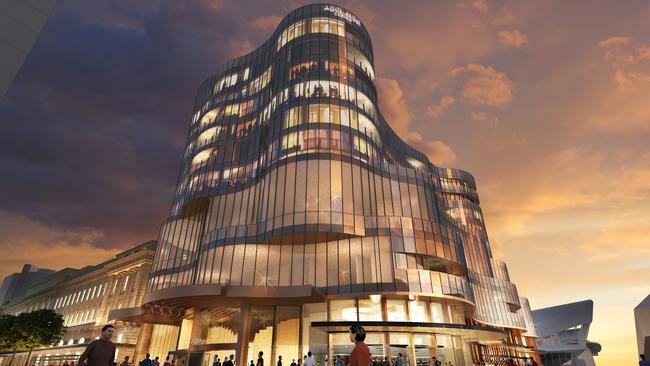
“At the end of next year you’ll have things like a plaza development,” Mr McEvoy said.
“That plaza will be a real heart and soul of Adelaide.”
Wide pathways that will be well-lit at night, as well as signage, will improve accessibility to the area, where there will be “more activity, not less” once its complete.
In August, Adelaide Venue Management CEO Anthony Kirchner celebrated the completion of the Adelaide Convention Centre expansion, and this month, the opening of its Home Ground cafe court.
“The centre is essential to the vibrancy of the Riverbank precinct and our events bring in the region of 275,000 visitors to the precinct every year,” he said.
“The ongoing redevelopment of the Riverbank Precinct has been key to marketing Adelaide as a destination and as a competitive player in the international conference market.”
Similarities have been drawn between Adelaide and Sydney’s Darling Harbour, and Melbourne and Brisbane’s successful Southbank precincts – especially with the introduction of an urban beach at Pinky Flat this summer.
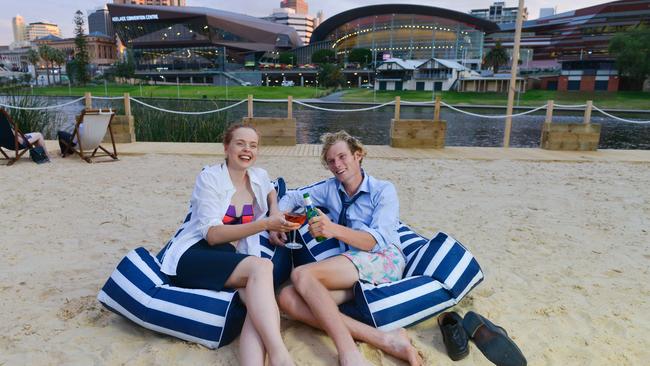
But University of South Australia urban geographer Matthew Rofe said instead of a cluster of residential developments close to the waterfront, Adelaide had a sense of scale and nature.
“(Melbourne) is very well done but it has a very strong sense that it’s a very dense, urban project,” he said.
“One thing Australian governments should take a real lesson about is the way that we can’t frame or box in the way people use public spaces.
“There needs to be a scope for spontaneity and that’s what really creates a vibrant place.”
Mr Rofe said the open space that Adelaide boasts between its buildings and the River Torrens gives communities and individuals an opportunity to engage and “make it their own”.
“Urban regeneration can’t just be based around high-end restaurants, cafes and bars, because while that activates the city in certain ways – and it presents a desirable physical landscape which is very elite and progressive in many regards – it also excludes a whole range of other people,” he said.
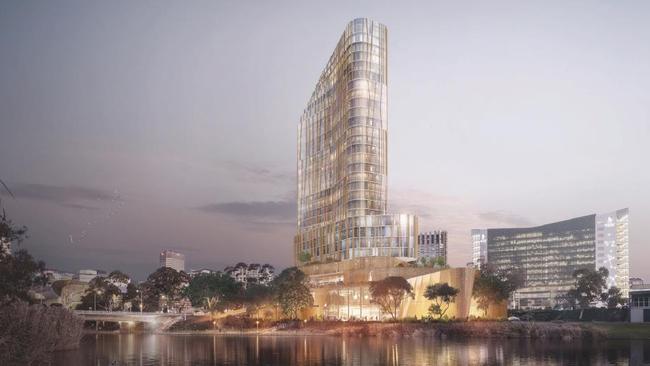
As construction across the area begins to ramp up, the state’s urban development body Renewal SA will continue to host a range of activities in the area, from an urban beach to its Winter Wonderland festival, so that people form a habit of wanting to be by the Torrens.
Mr Rofe said at a local level, pop-up events “create pride and engagement among local people”, and at a national level show that “Adelaide is not the dull city of churches or a big country town”.
But he warns they should not have a sense of permanence about them.
“It enables places to be enlivened and then it disappears or is packed up and moved somewhere else,” he said.
“Every summer, if a Torrens city beach appeared all the time, its novelty is going to reach saturation really quickly.”
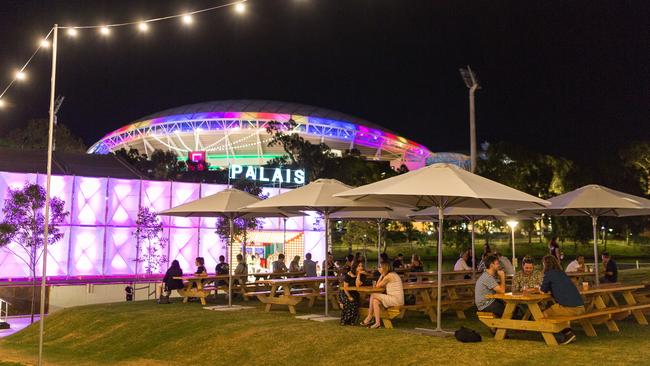
City of Adelaide Lord Mayor Martin Haese said as the custodian of the parklands, council was mindful that the Riverbank was well maintained and appropriately enhanced where required.
“The Riverbank precinct is a place for people,” he said. “Whether this be through events and activations, rowing, jogging, cycling along the Linear Park trail, university students using the banks of the Torrens for reflective time, people walking the footbridge on their way to Adelaide Oval or New Year’s Eve celebrations at Elder Park.”
He said council was supportive of new ways to entice people to the Riverbank and it works closely with the State Government and Riverbank Authority to ensure projects are worthwhile.
“Council does not support inappropriate development and the over-commercialisation of the Riverbank,” he said.
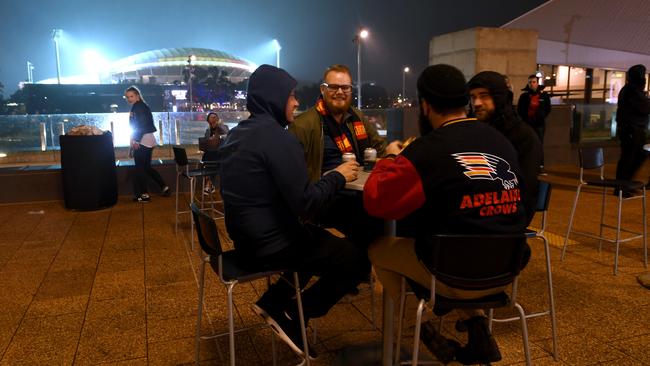
2011
The State Government publishes final draft master plan for the Riverbank precinct. Companies are asked to pitch ideas in the New Year.
2012
Draft design of the footbridge that will link Adelaide Oval with the Riverbank Precinct publicly released. Construction of the biomedical precinct begins including work on the new Royal Adelaide Hospital and the South Australian Health and Medical Research Institute.
SkyCity Entertainment Group propose casino redevelopment subject to tax concessions.
2013
A new master plan is revealed for the Riverbank precinct. The State Government plans to create a management authority to oversee the Riverbank development, and rezone to allow entertainment venues to be built along the Torrens. Adelaide Oval names Riverbank stand. SAHMRI opens and the University of Adelaide and University of South Australia announce new facilities in biomedical precinct.
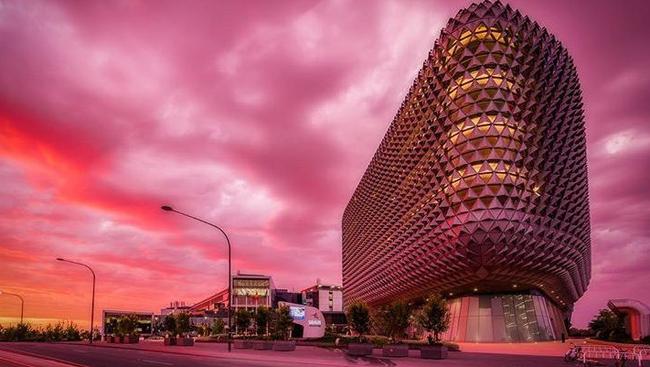
2014
Eastern stand completed as part of Adelaide Oval redevelopment. Riverbank bridge opens, investment made to transform the Adelaide Festival Centre Plaza, and Walker Corporation announce a car park redevelopment for the Festival Centre.
2015
SkyCity lodges plans for an 11-storey building with the Development Assessment Commission. The Convention Centre opens its west building, the first of its two-part redevelopment.
2016
SkyCity and State Government sign agreement approving an 80-room luxury hotel, restaurant and premium gaming complex. Funding is allocated for Market to Riverbank link project. Walker Corporation receive approval for a 27-storey office tower between Parliament House and the casino.
2017
The new Royal Adelaide Hospital and university facilities open in the biomedical precinct. The Adelaide Convention Centre opens its new east building. Festival Plaza redevelopment granted consent, and first stage of Adelaide Festival Centre redevelopment expected to be completed by end of this year.


